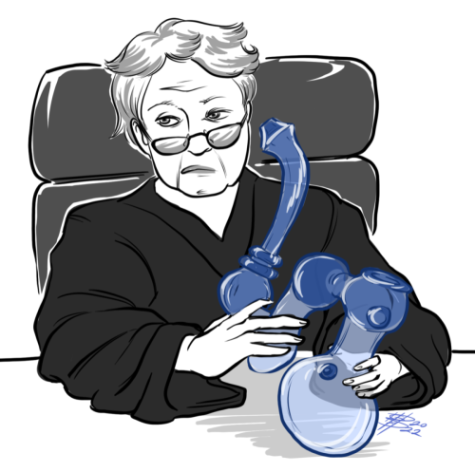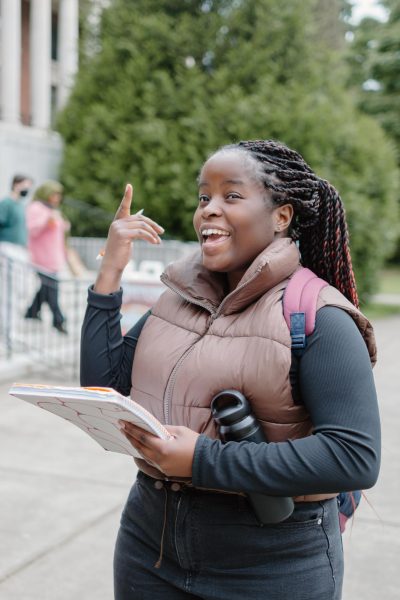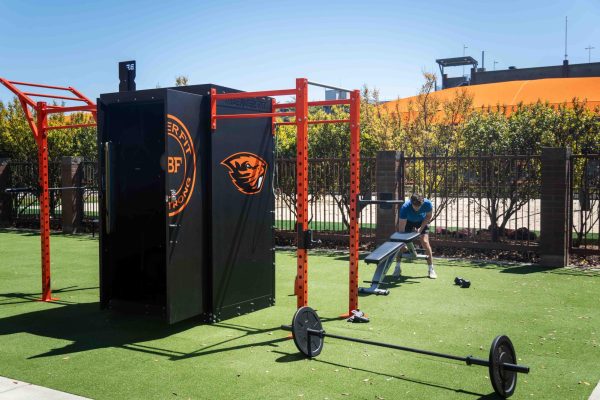Pot is no joke; what to know before you toke
Understanding cannabis regulation on and off campus

In recent years, Oregon has earned a reputation as a trendsetter when it comes to passing drug legislation.
With a progressive legislature and particularly headstrong leaders, many Oregonians have been pleased with active efforts at the state level to decriminalize and destigmatize the medicinal and recreational consumption of cannabis.
Today, many Oregonians enjoy cannabis in its various forms responsibly.
According to the United States Congress official website, federal regulation prohibits cannabis consumption or sales of any kind (except for veterans). As of late, the 1-3 Act of 2021 is pending to reclassify cannabis from a schedule I controlled substance to a schedule III controlled substance, but it is currently illegal to possess, use or sell cannabis under federal law.
The grounds of reclassification stand on cannabis’ low potential for abuse and dependence.
Schedule I drugs are designated by federal law as illegal outside of research purposes; schedule II drugs are allowed to be purchased for medical use (for those above 18 years old); and schedule III drugs are able to be purchased medically for anyone over 18 and purchased recreationally for any one resident over the age of 21.
Oregon currently classifies cannabis as a schedule II drug.
For Oregonians, when it comes to possession, you can keep up to four plants per household, no more than 10 seeds of cannabis, eight ounces of dried leaves and flowers, one ounce of concentrated extracts, 16 ounces of a cannabinoid product in solid form and 72 ounces of cannabinoid product in liquid form.
Cannabis dispensaries are prohibited from selling more than the state limits in any 24-hour period.
Of course, using it in public or driving while under the influence can still get you in a whole lot of trouble, according to What’s Legal Oregon.
The Oregon Liquor and Cannabis Commission oversees these laws. They license cannabis dispensaries and are responsible for regulating cannabis worker permits. The OLCC closely monitors businesses selling either alcohol or cannabis and will send in representatives to make sure their rules are being followed.
Oregon began passing laws decriminalizing cannabis possession in 1973, starting with a law that reduced the fine for possessing up to an ounce of cannabis from extensive jail time to a $100 fine, according to Nick Johnson, author of “Grass Roots: A History of Cannabis in the American West”.
In the ‘80s, the cannabis movement in California began spreading its way north, and hemp growers took advantage of Oregon’s temperate climate.
By 1998, cannabis enthusiasts had garnered enough momentum to pass Ballot Measure 67, which allowed “medical use of marijuana within limits” and established a permit system among healthcare providers in the state of Oregon, according to Ballotpedia.
The most recent significant legislative passage happened in 2014, with Measure 91 stating that anyone over the age of 21 can buy or use cannabis. This went to full effect on July 1, 2015.
For Oregon State University students, under the federal Drug-Free Schools and Communities Act of 1989, the Controlled Substances Act and the Drug-Free Workplace Act, the university has a no-compliance policy that prohibits students from using or possessing cannabis in any form on campus or during campus activities, according to the official policy from the school’s website.
Because cannabis is still a scheduled drug under federal law, and because OSU is federally funded, the university must defer to federal law over state law and treat cannabis as an illegal substance or else will risk losing a portion of its funding.
Students must adhere to campus policies or submit to disciplinary action varying on the extent of possession.
According to the Department of Public Safety’s official policy guide, search and seizure laws are contingent upon federal training, and making sure that new training occurs as new policies are introduced. As such, a valid warrant is necessary for search and seizure, in most cases.
Luckily, DPS is more concerned with the safety of OSU students than with encumbering them. Several times throughout the handbook, the privacy rights of students and maintaining respectful distance, especially with reference to search and seizure policies, is emphasized.
When mentioning arrests and approaching students suspected of carrying weed, the handbook states that officers should “strive to conduct searches with dignity and courtesy” and “should not search persons, vehicles or rooms without a cover officer present unless they reasonably determine that a delay in the search would present a greater safety risk.” This is done to keep investigating officers accountable for their actions.
While students older than 21 may buy and smoke cannabis off campus, students of any age should exercise caution when possessing, distributing or consuming cannabis anywhere near campus.















